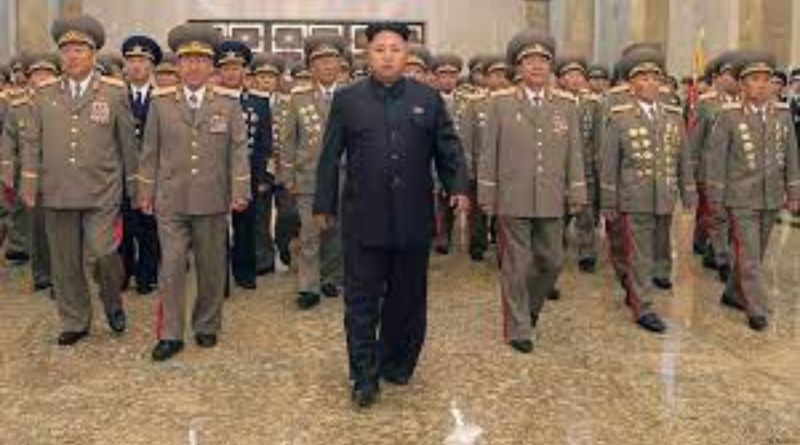North Korea, officially known as the Democratic People’s Republic of Korea (DPRK), is a country that has often been described as communist due to its authoritarian governance structure and its adoption of Marxist-Leninist principles in its early years. However, the reality of North Korea’s political and economic system is more complex and can’t be reduced to a simple label of “communist.” While the country was founded with communist ideals in mind, its system has evolved over time into a unique form of dynastic dictatorship with some elements of communism mixed with totalitarianism and Juche, a state ideology developed by its founder, Kim Il-sung.
In this article, we will explore whether North Korea is truly communist, how its political and economic systems operate, and how they have evolved over time. We’ll also address some frequently asked questions to provide a better understanding of North Korea’s political identity.
Historical Background: The Communist Roots of North Korea
North Korea’s roots lie in the Japanese occupation of Korea (1910–1945), during which the Korean peninsula was under colonial rule. Following Japan’s defeat in World War II, Korea was liberated, but the country was divided into two occupation zones: the Soviet-backed north and the U.S.-backed south. This division set the stage for the Korean War (1950–1953), which solidified the split into two separate nations: North Korea and South Korea.
In the north, the Soviet Union played a crucial role in helping establish a communist government. In 1948, Kim Il-sung, a former anti-Japanese resistance fighter and a Soviet-trained communist, became the leader of the newly formed Democratic People’s Republic of Korea (DPRK). Kim Il-sung, with Soviet backing, established a communist one-party state that adhered to the Marxist-Leninist ideology, which was a common framework for many Soviet-aligned countries at the time. The country’s early economic policies followed the central tenets of communism: state ownership of the means of production, a planned economy, and the creation of a collectivist society.
The Shift to Juche: The North Korean Model
While North Korea was founded on communist principles, it is important to recognize that over time, the country’s political system has evolved into something very different. In the 1950s, Kim Il-sung introduced the concept of Juche, which translates to “self-reliance” or “self-sufficiency.” Juche became the central ideology of the DPRK and served as a kind of North Korean socialism that placed the country’s political, economic, and military independence at the forefront.
Juche is often described as a form of nationalism more than traditional communism, though it draws on communist ideas like anti-imperialism and economic centralization. Under Juche, the government stresses complete loyalty to the leader (initially Kim Il-sung, later Kim Jong-il, and currently Kim Jong-un) and emphasizes the central role of the Communist Party in shaping the nation’s politics. The state’s focus on maintaining complete control over all aspects of society, including the economy, culture, and the military, has created a cult of personality around the ruling family, something that goes beyond the traditional Marxist-Leninist framework.
Thus, while North Korea maintains some characteristics of a communist state—such as a single-party system, a planned economy, and state control over most industries—it is not a purely communist system. Instead, it is more accurate to describe North Korea as a Stalinist regime with elements of Juche, where the communist principles of class struggle and proletarian internationalism are largely subordinated to a totalitarian and dynastic dictatorship under the Kim family.
North Korea’s Political System: Totalitarianism and Dynastic Rule
North Korea’s political system is highly centralized and operates under the absolute authority of the Supreme Leader, who has full control over the country’s military, government, and the ruling Workers’ Party of Korea (WPK). While the government officially calls itself a people’s republic, it functions more like a one-man dictatorship. The Kim family has held power since the establishment of North Korea in 1948, and leadership is passed down through family lines, creating a dynastic rather than a communist or socialist structure.
Under Kim Il-sung, and later his son Kim Jong-il and grandson Kim Jong-un, the country became a symbol of authoritarianism rather than true communist governance. Though the country retains some aspects of Marxist-Leninist economic and political theory, the personality cult surrounding the leadership is arguably more important than adherence to traditional communist ideals.
The Economy: Centralized Control with Market Reforms
North Korea’s economy is often described as a command economy, where the state controls the majority of economic activity. In this respect, it still holds true to the communist principle of state ownership of the means of production. The government directs the production of goods and services, and private enterprise is virtually nonexistent. The economy also emphasizes the development of heavy industries, including military production and infrastructure projects.
However, the country has faced significant economic challenges over the decades, including sanctions, food shortages, and an underdeveloped infrastructure. In response, North Korea has gradually introduced some market-oriented reforms over the past few decades. Private markets have emerged, and the government has allowed some degree of private enterprise to operate in certain areas. These market reforms, though small in scale, have led some analysts to question whether North Korea is moving away from traditional communist economic models toward something closer to state capitalism.
Despite these market-oriented reforms, the centralized control of the economy and the lack of political freedoms remain key features of the North Korean system. The economy is still heavily influenced by the Kim regime, which uses economic power as a means of consolidating its authority.
Is North Korea Communist?
In short, North Korea is not a purely communist state in the traditional sense. While it was founded as a communist country with Marxist-Leninist principles, over time it has developed its own unique form of governance based on the ideology of Juche, which is a self-reliance model that blends elements of communism, totalitarianism, and dynastic rule. The country’s political system is characterized by authoritarian leadership under the Kim family, rather than collective leadership as seen in traditional communist states. Economically, while North Korea still maintains a command economy, it has introduced market-oriented reforms in recent years.
Thus, it would be more accurate to describe North Korea as a Stalinist-style regime with a dynastic dictatorship, rather than a straightforward communist state.
Frequently Asked Questions (FAQs)
1. Is North Korea a communist country?
North Korea was founded as a communist state but has evolved into a totalitarian regime under the Juche ideology, which places a strong emphasis on self-reliance and loyalty to the ruling Kim family. It retains some elements of communism, such as state control of the economy and a one-party system, but it is not a purely communist state.
2. What is Juche?
Juche is the official state ideology of North Korea, developed by Kim Il-sung. It focuses on self-reliance, national independence, and loyalty to the leader, rather than class struggle or international revolution, which are central to traditional communism.
3. Does North Korea still have a command economy?
Yes, North Korea still maintains a command economy, where the state controls most industries and economic activities. However, over the years, market-oriented reforms have allowed some level of private enterprise, particularly in rural areas and informal markets.
4. Why is North Korea considered a totalitarian state?
North Korea is considered totalitarian because the government, led by the Kim family, exercises absolute control over all aspects of life in the country, including the economy, media, education, and even personal relationships. Political opposition is banned, and the state uses fear, surveillance, and indoctrination to maintain power.
5. What role does the Kim family play in North Korea’s political system?
The Kim family holds absolute power in North Korea. Leadership is passed down through the family, making the regime a dynastic dictatorship. The ruling Kim family is at the center of the country’s political, military, and cultural life, with the country’s ideology of Juche elevating the leader to almost god-like status.
6. Is there any private business in North Korea?
While North Korea’s economy is predominantly state-run, there has been some limited market activity in recent years. Private markets, often referred to as “jangmadang”, have developed, and some small businesses operate under state oversight, but the government still controls most major sectors of the economy.
Conclusion
North Korea’s political and economic systems are deeply intertwined with its unique interpretation of communism, nationalism, and totalitarian rule. While the country was founded on communist principles, it has developed into a state characterized by Juche, a dynastic dictatorship, and significant central control. In many ways, North Korea’s government and policies are a hybrid of communism, authoritarianism, and self-reliance, making it distinct from other traditional communist states.



